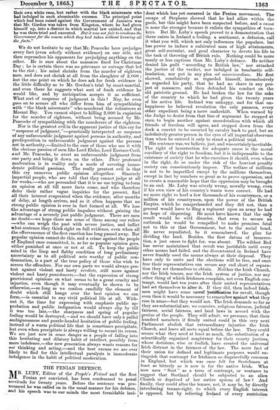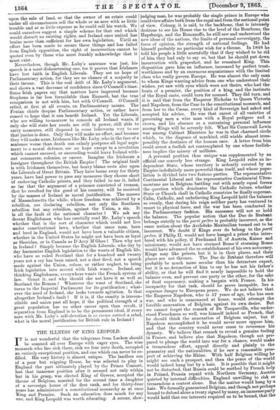ititi FENIAN DEFENCE.
lilt. LIMY, Editor of the People's Friend and the first
Fenian yet convicted, has been condemned to penal servitude for twenty years. Before the sentence was pro- nounced he was called on in the usual manner for his defence, and his speech was to our minds the most formidable inci- dent which has yet occurred in the Fenian movement. The escape of Stephens showed that he had allies within the gaols, but this might have been suspected before, and a cause is none the stronger because it enlists the sympathies of turn- keys. But Mr. Lnby's speech proved to a demonstration that there exists in Ireland a feeling, a sentiment, a delusion, can it what you will, which not only influences the populace, but has power to induce a cultivated man of high attainments, great self-restraint, and good character to devote his life to the task of throwing off British rule. Nothing could be more manly or less captious than Mr. Luby's defence. He neither denied his guilt "according to British law," nor attacked the justice of the verdict, nor indulged in bombastic self- laudation, nor put in any plea ad misericordiam. He first showed, conclusively as regarded himself, inconclusively as regarded his party, that he had no share in any pro- ject of massacre, and then defended his conduct on the old patriotic ground. He had broken the law for the sake of the country to which he had given the twenty years of his active life. Ireland was unhappy, and for that un- happiness he believed revolution the only panacea, every other expedient being a mere makeshift. When warned by the Judge to desist from that line of orpiment he stopped at once, to begin another against sacerdotalism with which all friends of freedom will agree, and stepped down from the dock a convict to be escorted by cavalry back to gaol, but an indefinitely greater person in the eyes of all impartial observers than when he entered it only to stand a political trial.
His sentence was, we believe, just, and wascertainlyinevitable. The right of insurrection for adequate cause is the moral corollary of the right to freedom, but it is indispensable to the existence of society that he who exercises it should, even when in the right, do so under the risk of the heaviest penalty society can conscientiously impose. The welfare of millions is not to be imperilled except by the millions themselves, except in fact by numbers so great as to prove oppression, and to create a reasonable hope that the oppression may be brought to an end. Mr. Luby was utterly wrong, morally wrong, even if his own view of his country's wants were correct. He had no more right to hurl a few thousands of his countrymen, or a million of his countrymen, upon the power of the British Empire, which he comprehended and they did not, than a general would have to fling a regiment upon an army he had no hope of dispersing. He must have known that the only result would be wild disorder, that even to secure an outbreak he would be compelled to make promises fatal not to this or that Government, but to the social bond. He never repudiated, be it remembered, the plan for dividing the land. Besides, the first datum of insurrec- tion, a just cause to fight for, was absent. The wildest Red has never maintained that revolt was justifiable until every other means had failed, and the discontented in Ireland have never frankly used the means always at their disposal. They have only to unite and the elections will be free, and once free their representatives can secure any end short of separa- tion they set themselves to obtain. Neither the Irish Church, nor the Irish tenure, nor the Irish system of justice, nor any other thing of which Irishmen complain, not even English con- tempt, would last ten years after their united representatives had set themselves to alter it. If they did, then indeed Irish- men might have some moral tertifieation for revolt, though even then it would be necessary to remember against -what they rose in arms—but they would not. The Irish demands so far as they are substantial are, we conceive, religious fairness, judicial fairness, social fairness, and land laws in accord with the genius of the people. They will admit, we presume, that their hundred members if firmly united could in this very next Parliament abolish that extraordinary injustice the Irish Church, and leave all sects equal before the law. They could secure what they need at least as much, the substitution of a
scientifically organized magistracy for their county justices, whose decisions, wise or foolish, have created the universal Irish distrust in the fairness of the law. The mere fact of their union for defined and legitimate purposes would ex- tinguish that contempt for Irishmen so disgracefully common in England, but which was once felt for Scotchmen at least as bitterly as it now is for the native Irish. Who now uses " Scot " as a term of contempt, or ventures to suggest that Scotland should be subjected to an alien Church or deprived of her native system of law ? And finally, they could alter the tenure, not, it may be, by directly
introducing tenant-right, to which every English interest is opposed, but by relieving Ireland of every restriction
upon the sale of land, so that the owner of an estate could under all circumstances sell the whole or an acre with as little trouble and at as little expense as he could sell his watch. We could ourselves suggest a simple scheme for that end which would disturb no existing rights, and Ireland once united has brains more than sufficient for her own legislation. Until an effort has been made to secure these things and has failed from English opposition, the right of insurrection cannot be quoted even by those who most frankly acknowledge that it must exist.
Nevertheless, though Mr. Luby's sentence was just, his speech IB a most disheartening one, for it proves that Irishmen have lost faith in English Liberals. They see no hope of Parliamentary action, for they see no chance of a majority in their favour. This is the real drift of Mr. Luby's argument, and shows a vast decrease of confidence since O'Connell's time. Some Irish papers say that matters have improved because Stephens is far less formidable than Emmett, but the true comparison is not with him, but with O'Connell. O'Connell relied, at first at all events, on Parliamentary means. The Fenian chiefs despise Parliamentary action, or rather have ceased to hope that it can benefit Ireland. Yet the Liberals, who are willing to-morrow to concede all Ireland wants, if only she will state her needs, are still in power, still able to carry measures, still disposed in some lukewarm way to see that justice is done. Only they will make no effort, and because they will make none, Irishmen like Mr. Luby, who in the face of a sentence worse than death can calmly postpone all legal argu- ment to a moral defence, see no hope except in a revolution which cannot succeed, or succeeding would leave Ireland with- out commerce, colonies, or career. Imagine the Irishman a foreigner throughout the British Empire I The original fault is with Irishmen themselves, but heavy blame rests also upon the Liberals of Great Britain. They have borne sway for thirty years, have had power to pass any measures they choose short of endowing Catholic priests, and they failed to use it, failed so far that the argument of a prisoner convicted of treason, that he revolted for the good of his country, will be received by the masses of Ireland as moral justification. The masses of Massachusetts the while, whose freedom was achieved by a rebellion, are declaring rebellion, not only the Southern rebellion but any rebellion, against the Union, a sin. It is all the fault of the national character? We ask any decent Englishman who has carefully read Mr. Luby's speech whether that is the sort of character which could not live wader constitutional laws, whether that same man, born and bred in England, would not have been a valuable citizen, whether in the United States he might not have been as loyal as Sheridan, or in Canada as D'.Arcy M'Ghee V Then why not in Ireland ? Simply because the English Liberals, who day by day harmonize English legislation to the wants of English life, who have so ruled Scotland that for a hundred and twenty years not a cry has been raised, not a shot fired, not a speech made against the Union, refuse, or rather neglect, to bring Irish legislation into accord with Irish wants. Ireland, say thinking Englishmen, everywhere wants the French system of law. Grant it, and why should she not have it as well as Scotland the Roman ? Whatever the want of Scotland, she turns to the Imperial Parliament for its gratification ; what- ever the need of Ireland, she looks towards agitation. Is that altogether Ireland's fault ? If it is, if the enmity is irrecon- cilable and union past all hope, if the political strength of a great population has no other career open than revolt, if separation from England is to be the permanent ideal, if every man with Mr. Luby's self-devotion is ex rerum natant' a rebel, what is the moral justification for British rule in Ireland



































 Previous page
Previous page